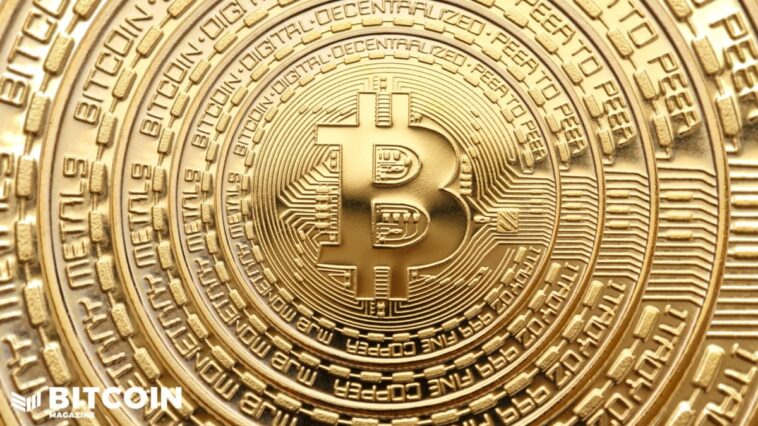Just over 50 years ago, Richard Nixon ended the U.S. dollar’s gold backing. In the 50 years since, it’s been clear that we need Bitcoin.
Not much can be more satisfying to historians, economists and statisticians than to delve back to a past year or era. When data and research from yesteryear are compared to that of today’s world, experts can begin to pinpoint just how meaningful and influential prior events in history became.
With regards to the United States, a quick internet search dishes out a handful of mildly interesting facts from the year that was 1971. Aside from little tidbits, such as Disney World opening and the Apollo 14 moon mission, some other events ended up having greater long-term effects on the country than contemporary audiences may have thought.
Intel introduced the first microprocessing chip, a cornerstone advancement that helped contribute to the towering tech wave that our society is still riding. The 26th Amendment lowered the voting age to 18, empowering millions of young Americans. The 1971 release of the “Pentagon Papers” was, and still is, fuel to libertarians and others skeptical and untrusting of the government. Lastly, the NASDAQ index made its debut, joining the S&P500 and Dow Jones to create today’s three-headed monster.
Fifty Years Since The End Of The U.S. Dollar Gold Standard
But, after half an hour of scrolling through the internet’s interpretation of 1971’s relevant happenings, I didn’t see any website or article cater to the seemingly mundane circumstance that I believe has eventually had greater repercussions than any aforementioned event. Fifty years ago this month, President Nixon announced the end of the gold standard to the U.S. monetary system. After a couple of years of the dollar still operating on a fixed exchange rate to gold, the results of the final ties being severed in 1973 are disturbing.
With the country’s debts no longer obliged by gold, rampant spending occurred that drove annual deficit numbers into unprecedented territory — and it appears they will never recover. The immediate consequence reveals that from 1973 to 1980, the nation underwent arguably the worst inflationary period in U.S. history, with the Consumer Price Index spiking from 42.7 to 78.
Government deficits and inflation rates aren’t uncommon topics of discussion. Yet the conversation rarely delves into the specific resulting economic impacts. The most revealing data from the end of the gold standard era is the change of income growth for the top 1% compared to the bottom 99%. For a 35-year timeframe preceding the end of gold-backed dollars, the bottom 99% of Americans were slowly increasing their slice of the wealth pie, peaking with a pre-tax income growth approximately twice that of the 1% in 1973. The following decades resulted in a burst for the top earners, and in 1997 their income growth surpassed the 99% and has never looked back.
Significant trend reversals like this can sometimes stay quiet and hidden to the public eye for a very long time. Income inequality in the U.S. wasn’t as popular of a debate until the last decade or so, and it has intensified greatly with the whirlwind of the year 2020. In a time full of shutdowns and layoffs, inexplicable phenomenons are underway regarding wealth distribution. Despite $3.7 trillion in global lost labor in 2020, billionaire wealth increased by $3.9 trillion. It’s not the first time market panic somehow led to growth for the 1%. Within a few years of the 2008 recession, their income soared 31.4%, compared to just 0.4% for the 99%.
The Need For Bitcoin
How exactly does Bitcoin fit into all of this? The root cause of income inequality starts with the printing of money. Nine trillion dollars were watermarked in 2020, an estimated 22% of all USD in circulation. This money is distributed to banks and corporations with the supposed idea it will refresh the economy and stimulate growth, trickling down through multiple levels. What instead ends up happening is the wealthy have the luxury of hoarding and investing that money, leading to artificially inflated stocks that are driven up partially in fear of a collapsing dollar.
In the cases of the 2008 financial crisis and 2020 pandemic, the struggles of the lower and middle classes also led to increased loans and lending, allowing the rich to accrue more interest. Recessions additionally accelerate the growing monopoly on housing and real estate, with tighter money preventing millions from putting down the necessary payments to own a home.
It’s difficult to speculate on what could possibly end the cycle of money slowly seeping into the pockets of corporate America and the top 1%. Regularly suggested ideas include higher taxes for billionaires, the raising of minimum wage and making higher education more affordable. Most can agree if something doesn’t change soon, statistics such as the fact that the bottom half of America has a negative net worth, will only get scarier. Unfortunately none of those solutions would make significant long term impacts if the Federal Reserve continues to treat the dollar the way it has the past 50 years.
Bitcoin provides a unique scenario in which money stops looping from the Federal Reserve to banks and corporations, and then down to middle and lower class America right as inflation is finally kicking in and its value diminishes. With a Bitcoin standard, it’s quite possible that adequate wages would redevelop without government involvement based on prior decades with the gold-backed dollar. The lack of new money thrown into the economy eventually balances wealth as the rich can no longer hoard and control the majority of assets and property.
Acting as a form of digital gold, bitcoin also gives the common person easier access to store wealth compared to other more expensive, and arguably more risky, investments in stocks and real estate. This is important when again keeping in mind the vast influx of printed money in recent years; inflation has not hit at near the rate it theoretically should eventually reach. Meaning it either will in the coming years, or there is further proof this money is locked away by the 1% in the form of bloated stocks and investments.
Bitcoin’s 12-year track record demonstrates it is not a fad ready to die at any moment, and the narrative is further growing in the necessary directions. Bitcoin is a long game, and will continue to operate as such. Monetary systems and societal structures don’t change overnight.
Something as ambitious as Bitcoin will surely need to ease through multiple generations to ever have a chance at accomplishing its main goal of making money powerless. But when everyone is in control of Bitcoin, it ends up being controlled by nobody, unlike the dollar’s former gold standard.
Sources
- https://inequality.org/facts/income-inequality/#wage-inequality
- https://mises.org/wire/inequality-and-gold-standard
- https://www.minneapolisfed.org/about-us/monetary-policy/inflation-calculator/consumer-price-index-1913-
- https://tcf.org/content/commentary/income-inequality-reached-record-level-in-2012/?session=1
- https://www.somagnews.com/9-trillion-story-22-of-us-dollars-printed-in-2020/
- https://www.bls.gov/cpi/
- https://www.newyorker.com/news/john-cassidy/american-inequality-in-six-charts
- https://fred.stlouisfed.org/series/CPIAUCSL
This is a guest post by Andrew. Opinions expressed are entirely their own and do not necessarily reflect those of BTC Inc or Bitcoin Magazine.




